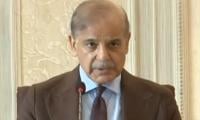ISLAMABAD: The Supreme Court (SC) Thursday questioned the legality of trial of civilians in military courts and adjourned the hearing for Friday (today).
A seven-member constitutional bench, headed by Justice Aminuddin Khan, heard the intra-court appeals (ICAs) filed by the federal government against the apex court judgment, delivered last year on October 23, declaring the trial of civilians in military courts as unconstitutional.
Other members of the bench are Justice Jamal Khan Mandokhail, Justice Muhammad Ali Mazhar, Justice Syed Hassan Azhar Rizvi, Justice Naeem Akhtar Afghan, Justice Shahid Bilal Hassan and Justice Musarat Hilali. Khawaja Haris, counsel for the defence ministry, continued his arguments.
Justice Jamal Khan Mandokhail questioned the legality of trying civilians under the armed forces disciplinary framework and asked how a person, who is not in the armed forces, could fall under military discipline. However, he questioned, if a person has no relation with the army, then how he could be subjected to its discipline. He observed that a person, who works in the agriculture department, will be subjected to the department’s discipline. “Will it not be a violation of Article 8 of the Constitution to bring an unrelated person under discipline,” Justice Mandokhail asked.
Khawaja Haris replied that if the law permits, discipline would be applied. He submitted that in certain circumstances, the Army Act is also applicable to civilians, adding that there was a judicial decision of the Supreme Court on that point as well.
Justice Musarat Hilali told Khawaja Haris that copies of FIRs registered against people currently in the military court custody were not provided to the court. Khawaja Haris submitted that the apex court’s judgment in the military courts’ case consisted of provisions of the Army Act that were declared null and void and, in the other part, the custody of the accused had been given to the military court.
Justice Mandokhail observed that the entire case of military courts revolved around Article 8 of the Constitution, while Muhammad Ali Mazhar inquired as to whether the five-member bench had held the provisions of the Army Act as inconsistent with Article 8 of the Constitution. “And if so, what justification was given by the five-member bench in this regard,” Justice Mazhar asked.
Justice Muhammad Ali Mazhar also observed that in the case of F B Ali and Sheikh Riaz Ali, the larger bench comprising four judges had annulled the provisions of the Army Act in the decision. Khawaja Haris contended that the court did not have the authority to annul the Army Act. Justice Jamal Mandokhail asked, “If someone thinks of incitement, the Army Act will also be applied to him. Hasn’t the Army Act rendered Article 8(1) of the Constitution ineffective and can the Army Act be applied to civilian accused?” he asked the counsel. Khawaja Haris submitted that Article 10-A of the Constitution regarding fair trial is also applicable to military trials.
Justice Muhammad Ali Mazhar observed that the constitutional bench was hearing the ICAs against the SC decision related to the military courts and asked the counsel to first point out the defects in the apex court’s judgment. Justice Mandokhail said the constitutional bench could review any constitutional point even in intra-court appeals, to which Justice Mazhar said, “I do not disagree with the observation of the brother judge.”
Justice Mandokhail observed that the highest position in Pakistan was that of the president, adding that if there was an attack on the President House, the accused would be tried in the special anti-terrorism court. And if the army installations were attacked, then the trial of accused would be held in military courts, the judge remarked. Khawaja Haris submitted that the decision was taken by legislators through legislation.
Justice Musarat Hilali inquired whether a lawyer was allowed in the military court trial and all the materials were provided to the accused. Khawaja Haris replied that in the military court, the accused was provided with a lawyer and all relevant materials as well. Justice Mandokhail asked if a soldier kills his officer, then where the case will go? Khawaja Haris replied that the murder case would be heard by a common court. Justice Mandokhail remarked as to how a person, who is not a subject of the Army Act, could be deprived of his basic rights. Khawaja Haris submitted that the army could not work without discipline.
Justice Mandokhail remarked that he had read history, adding that the concept came during the time of Hazrat Umar (RA) that armed forces would be separate from civilians, while the laws for the armed forces would also be separate.
Last year on October 23, a five-member larger bench of the Supreme Court declared the trial of civilians in the military courts as unconstitutional and held that 103 persons and others, who might be placed in relation to the events arising from May 9 and 10, could be tried by criminal courts.
The petitioners, including former chief justice of Pakistan Justice Jawad S Khawaja, former prime minister and PTI founder chairman Imran Khan, Barrister Aitzaz Ahsan, Supreme Court Bar Association Karamat Ali, Zaman Khan Vardag and Junaid Razzak, had challenged in the apex court under Article 184(3) of the Constitution the trial of May 9-10 suspects in military courts. The court, by a majority of 4-1, had declared the trial of civilians in military courts as unconstitutional.
Meanwhile, on December 13, 2023, a six-member bench of the apex court, by a majority 5-1 with Justice Musarat Hilali dissenting, had conditionally suspended its judgment delivered on October 23, declaring the trials of 103 civilians in military courts as unconstitutional.
Rajab Butt has been embroiled in controversy for years, including over his brief custody of lion cub
Strict actions were also ordered against drivers charging fares higher than official rates
In contrast, daily allowance has also been raised to INR2,500 from Rs2,000 earlier, notification states
On Tuesday, Bangladesh Army strongly refuted an India Today report, calling it false and baseless
Inflation had fallen to 9.32% in February, lowest level in 22 months, Yunus said, and he hoped it would drop below 8%...
Prof Jamal pointed out that parents of premature babies often struggle to afford specialised formula







